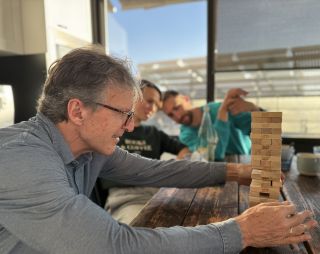Caregiving
Jenga and the Caregiver's Journey
Personal Perspective: The act of balance in caregiving.
Posted May 7, 2024 Reviewed by Gary Drevitch
Key points
- Chronic disease is shared by a care partner.
- Every day is a balancing act requiring skill and attention to detail.
- When things go wrong, give yourself space and time to recover and accept apology.
- Like in the game of Jenga, reset to carry on and keep playing.

I used to think that I understood the difference between the disease and the man I fell in love with but now the line feels blurry. We both live with the disease, and it is present in everything we do. I’ve understood and expressed Parkinson’s Disease as the unwanted ever-present guest, and while it inhabits my husband and not me, I suffer too. Many of you caring for a person with a chronic and often debilitating disease understand this.
This was made more clear a few months ago, when my husband stumbled while dismounting his bike. We were in a crowded plaza, and I was busy parking my bike when he fell on me, knocking me to the ground. As I lay there feeling the effects of hitting pavement with his body and two bikes — roughly 200 pounds total — on top of me, I hurt all over, but my fingers throbbed. Later I’d learn my pinkie was broken. It could have been worse. He was uninjured and untangled himself with the help of bystanders who thankfully rushed to help us. I resisted getting up right away preferring to assess my level of injury and to have a moment to take a breath. I closed my eyes and worked hard to calm myself. Anger is a rare and uncomfortable emotion for me, and I did not want to explode, especially in a public place, so I took a little time and let it pass. He helped me to a chair and a stranger kindly brought me ice. Recovery began the minute I took the first breath, gave myself space, and allowed myself to accept his apology but the pain – both physical and emotional – has lingered.
Parkinson’s disease takes and takes from both of us at unpredictable moments like this one. My husband of 40 years – more than half of them with Parkinson’s — didn’t mean to stumble, nor did he intend to hurt me. He isn’t clumsy by nature, but he trips often now due to a few reasons: the disease-wrought lack of muscular coordination makes foot placement unpredictable and his declining decision-making (known as executive dysfunction and common for people with Parkinson’s) is impaired, especially when he’s tired and results in a lack of planning for the inevitable moments of imbalance. Over time, his body is like the game of Jenga, where vital pieces are being pulled out of a tower of blocks, and you know a fall is coming. If you are able-bodied like me, it’s almost impossible to imagine what this must feel like, this loss of capacity to think clearly and to reliably function. I see it almost hourly but don’t know how it feels, even when I share the frustration and especially on the rare times when I suffer the consequences.
Weeks later, I watched him topple over again and felt powerless to help but grateful I wasn’t his landing pad. So far, he’s never injured himself in a fall and is quick to scramble to his feet and brush it off. Strangers think he might be drunk, because why else would he stumble and stagger? People with Parkinson’s joke about this and I’ve seen one wearing a t-shirt reading, "I’m not drunk, I have Parkinson’s Disease."
But it’s no joke and every fall puts him – and me — at risk for injury.
Like all care partners, I need to be healthy for the person I care for. None of us have time to get hurt, sick, or nurse a long-term injury. When I injured my hand, I willed myself to brush it off but couldn’t begin to heal without forgiveness. To his credit, there hasn’t been a single day when he hasn’t apologized for the pain he caused. It’s helped me to hear him apologize because I’m sorry too. I know he didn’t mean to hurt me. Accepting the apology despite my anguish is as important to healing as it is to our capacity to carry on.
Our future is predicated on us taking care of each other for as long as we can no matter how often we stumble and even — or especially — when we fall. And falls are inevitable, just like in a game of Jenga, because crucial building blocks are systematically being withdrawn. He can’t always help it, but with the right skill set, patience, and attention to detail, he can do better. We can do better. I don’t have a solution, but he's promised to do his best to be more careful. And I remain more vigilant now and in the future. This vigilance comes at a price to my well-being, and I know even my watchful eye can’t prevent inevitable falls. And as in Jenga, we’ll keep putting the pieces back together and do our best to enjoy the game.


